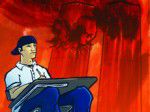Changing the world because of 9/11

September 13, 2007
Tuesday marked the sixth anniversary of the 9/11 attacks on the World Trade Center and Pentagon, which resulted in the deaths of almost 3,000 innocent Americans at the hands of terrorists.
Nineteen hijackers, four commercial airplanes and one plan had the power to change the course of human events.
The time is dwindling down to Nov. 4, 2008, when millions of American college students will be given their first opportunity to cast votes in a presidential election.
On this day, the nation will witness the emergence of the voice of a generation that has been silent for the past 18 years.
Faced with a difficult decision, students are mentally torn between conflicting political views and the media agenda.
Zachary Hayes, co-president of Villanovans for Peace, is already finding himself at odds with much of the information being released to the American people through the press and other outlets.
“The problem is, there is so much rhetoric against certain ideas,” Hayes said. “After 9/11, patriotism was completely redefined – the worst thing that came across was this idea that people shouldn’t speak out against the government.”
Convinced that the government and media have exploited these attacks through the creation of laws such as the Patriot Act, Hayes fears that today’s collegiates are merely consenting to mainstream ideas and trends without reflecting or voicing their own opinions.
“Someone once said that people view their country like their parents,” Hayes said. “The wrong people look at the country like a father, in that there is no debate when a decision is made. The other group – the correct group -approaches their country like a mother, which involves much more interpretation and opinion.”
Advocating a peaceful and patriotic approach to government does not necessarily involve radical viewpoints or the breaking of traditions, Hayes said. In fact, Hayes believes that a patriotic person will want what is best for the country, which will require a personal and objective analysis of the situations and ideas that are in debate.
Historically, the youth of America have been responsible for the creation of social movements that have spanned nations across the world. Some view the upcoming elections as a chance for the rising generation of voters to test the political waters for the first time and decide what temperature is right for them.
It goes without question that the war in Iraq will be a major issue in the upcoming presidential election in 2008. This is the precise reason for the mass March on Washington this Saturday.
Thousands of children, students, adults, veterans and their families will assemble in front of the White House in Washington D.C. to engage in an anti-war protest that will coincide with “the very moment that the Petraeus report is released and Congress takes up spending over $100 billion to prolong the war,” according to pephost.org, one of the official Web sites for the march.
In addition to the mass March on Washington, there will be a mass “die-in” that will symbolize the deaths of U.S. soldiers and volunteers in Iraq along with Iraqis that have been involved in the conflict.
Similar to a “sit-in,” this act is a form of civil disobedience that requires those involved to risk arrest in the event that the protest is broken up.
This dramatic simulation is meant to reach out to those members of Congress who are responsible for influencing the war, in hopes that these protesters can help the government think twice about the decision to stay in Iraq.
“You really can’t realize your impact or what your policies do until you see it take place,” Hayes said. “This is a good representation of the amount of people that have been affected by this war.”
Villanovans for Peace will send a bus of 32 students to the March on Washington this weekend with the intention of raising ?awareness and adding personal impact to the situation.
“This [protest] can boost people’s confidence and help them realize that they aren’t the only ones that have feelings towards this issue,” Hayes said.
“A lot of the media tends to show protests from afar, which almost gives them the sense that they are forbidden. It can make people afraid to join in.”
The idea of attending a protest may leave some students uncomfortable, since many feel participation in these acts usually involves radical ideologies and results in uncontrollable situations.
“There are a lot of normal people that do protests too,” Hayes said. “You don’t have to be from the 1960s to do a protest … I mean, ?the Boston Tea Party was a protest and they wore knickers!”
He said the objective for this trip is to raise awareness in Washington as well as among members of the student body.
Hayes stresses the importance that Villanovans explore their personal viewpoints in order to make objective decisions about important real-world events.
He feels it is imperative that members of the student body educate themselves on situations without relying on the media and other forms of information in order to prevent confusion when it comes to the elections in 2008.
“There are a lot of smart people on campus who know you don’t have to be radical to look at something objectively,” Hayes said.
“However, if I was someone who was interested in learning more about a situation, I would go to a meeting or a talk just to see how it goes. It is important to see the other side.”










